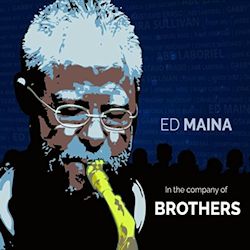 BUY NOW AmazonUK AmazonUS |
In the Company of Brothers
|
Ed Maina – In the Company of Brothers
This Is the Moment
You're Still Here With Me
Quelly's Song
Priscilla
Mi Hermano
Freed Indeed
Picture of Hope
My Father's Sky
Imela Chukwu
Amazing Grace
Imela Chukwu (Reprise)
Ed Maina (alto, soprano and tenor saxophones, clarinet, alto flute, piccolo): Rick Krive, Jim Gaisor, Kemuel Roig (piano): Dave Cabrera (rhythm guitar): Jonathan Orriols, Gustavo Eraso (solo guitar): Gabby Bivas, Abe Laboriel, Oskar Cartaya, John DiModica (bass): Hector ‘Pocho’ Nuciosup, Charlie Santiago, Daniel Berroa (percussion) Abner Torres, Hilario Bell (drums): Ira Sullivan (trumpet solo) Jim Hacker (trumpet, flugelhorn): John Kricker (trombone): Rick Krive, Javier Dias, Carolina Herrera (vocal): Priscilla Wagner (bass flute): Chuk Wu (prayer on Imela Chukwu): Eddy Garcia (Kalimba on Imela Chukwu)
No recording details
PRIVATE [55:29]
If the Almighty sanctions Soul, then Ed Maina – who thanks him in his sleeve note – is well placed to preach the message in his latest album. The multi-instrumentalist and his band of brothers serve up a varied palette of tempos and styles and are never tempted to coast along, even though they largely ignore the lure of standards.
Maina’s alto playing, cool and precise on This is the Moment, acts as an apt foil for the rockier, raunchier guitar work of Jonathan Orriols whose take-off solo is seconded by the throbbing bass work of Gabby Vivas, a potent presence. On one of his own compositions, the slow ballad You’re Still Here with Me – there are six all told whether credited solo or as co-composer – Maina plays clarinet and alto flute with clarity and poise: think of Jimmy Hamilton, but with a much warmer tone. But there are lissome Latino moments during the album too, such as Quelly’s Song where his flute playing is fast, forceful and focused.
One of the very best tracks in an album of consistently good things is the Maina-Billingsley piece Priscilla. Coursing with filmic romanticism this soulfully funky opus shows Maina at his considerable best as composer and performer – and he can blow hard when required - though the rhythmically vivacious Mi Hermano sees him playing flute with dexterous speed abetted by pianist Kemuel Roig. Funky, though tautly smooth, is Freed Indeed in which the expanded horn section can be heard at its fullest. Soloist Ira Sullivan plays a characteristically sassy muted solo. It would have been good to have heard more from him.
Maina dons the soprano sax for the laid-back ballad Picture of Hope where Rick Krive’s keyboard styling can be appreciated. It’s clear from these personnel call-outs that the brothers are many and varied and the ever-changing personnel bring new qualities. The prayerful chants and laid back rocky groove on Imela Chukwu – I assume the solo guitarist is again Orriols and not Gustavo Eraso – offers an example of this changeability, the song being briefly reprised, and clarified, as a trio version at the album’s end; just tenor sax, guitar (definitely Eraso) and bassist Abe Laboriel. There’s also quite an allusive version of Amazing Grace for just Maina’s piccolo and Priscilla Wagner’s bass flute.
There is much variety on offer here, from a shifting raft of musicians. What remains constant is Maina’s communicability, freshness and collegiate approach.
Jonathan Woolf